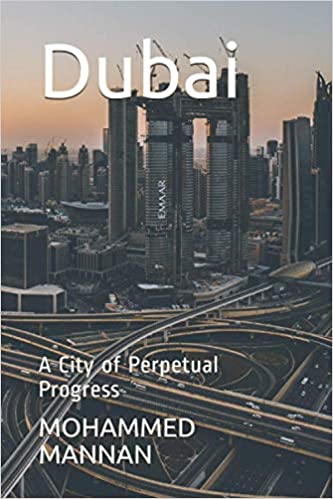Dubai’s Dynamism And Diversification Traced In A Unique And Exhaustive Book

A long-time resident and an independent writer has published a well-researched, factually-taut and exhaustive book Dubai’s most tectonic transformation in over half a century and confident march towards consolidating itself in the coming years.
In the 275-odd pages book, Dubai – A City of Perpetual Progress, the author, Mohammed Abdul Mannan has traced the dynamism and diversification that contributed towards the city-state enormously expanding and strengthening its non-oil revenues for the economy which represents a Gross Domestic Product of US$102.67 billion in 2018.
Despite the Covid-19 pandemic having an all-encompassing impact on the economy in the world’s fourth most-visited tourist destination, Dubai is steaming ahead with trademark development tempo with an approved budget of US$15.5 billion for 2021. This year, the enterprising emirate is due to host in October the postponed by a year edition of a global expo, the first in the Middle East, North Africa and South Asia (MENASA) in its 150 years of history.
“In urban history, Dubai stands out. Its unbridled growth and development have been breath-taking and worth emulating and it is pumping its way in the 21stcentury in splendid style and substance. Dubai has a master-plan up to 2040 to make itself smart, sustainable, competitive and resilient. As had been the case in its 187 years of modern history, Dubai remains a city in perpetual progress,” remarked Mohammed who earlier penned eight books including Dubai-A City Making History and Behind the Mask –The Story of Covid-19 during his stay in the DXB for about 25 years.
How transformative Dubai will be in the coming years is sheer mindboggling. The world’s most cosmopolitan city with 83 per cent of its residents foreign-born will have a population of 9.5 million inhabiting a third of its landmass by 2027. It will be spending US$1.6 billion to be a ‘green paradise’ by 2025 with a new addressing system five years later, and, by 2050, will be the world’s cleanest and greenest city. By 2031, 25 per cent of its patrol force will be by robots. Dubai is already the most- ‘surveilled’ city with 12.14 cameras per 1,000 residents.
Host to over one billion passengers as the world’s 18th most-internationally-connected airport, aviation will contribute 45 per cent of Dubai’s GDP by 2030 – US$88.1 billion. Dubai has set out to achieve a zero-fatality rate to be amongst the world’s safest cities in traffic safety. By 2030, Dubai will have more than 7,500 streets making traffic management a challenging task. Dubai is investing US$23.4 billion by 2025 to have the lowest carbon footprint in the world. Dubai aims 25 million visitors by 2025. Its skyline is impressive as it hosts 17 of the world’s tallest 100 towers and enjoys 13th position globally with 493 skyscrapers.
Dubai is seeking a greenery density of 12.5 square metres per person all along developing beaches on its 170 kilometres coast. Dubai is home to the world’s largest number of private schools and the enrolment will reach 470,000 students by 2022. Dubai is pursuing a strategy for 70 per cent of healthcare services to be provided by the private sector. Dubai’s 25-odd free zones are projected to generate an extra US$44 billion for its economy in line with its Industrial Strategy 2030. Dubai already has the second-highest mall density in the world with 96 malls, with a 1,214 square metres GLA per 1,000 people and it also has 42 theatres, 25 museums and 65 art galleries.
Links for the book/extracts
https://www.amazon.com/dp/B08VYM5C4P
https://www.amazon.com/dp/B08VYR5ZV6?ref_=pe_3052080_397514860


